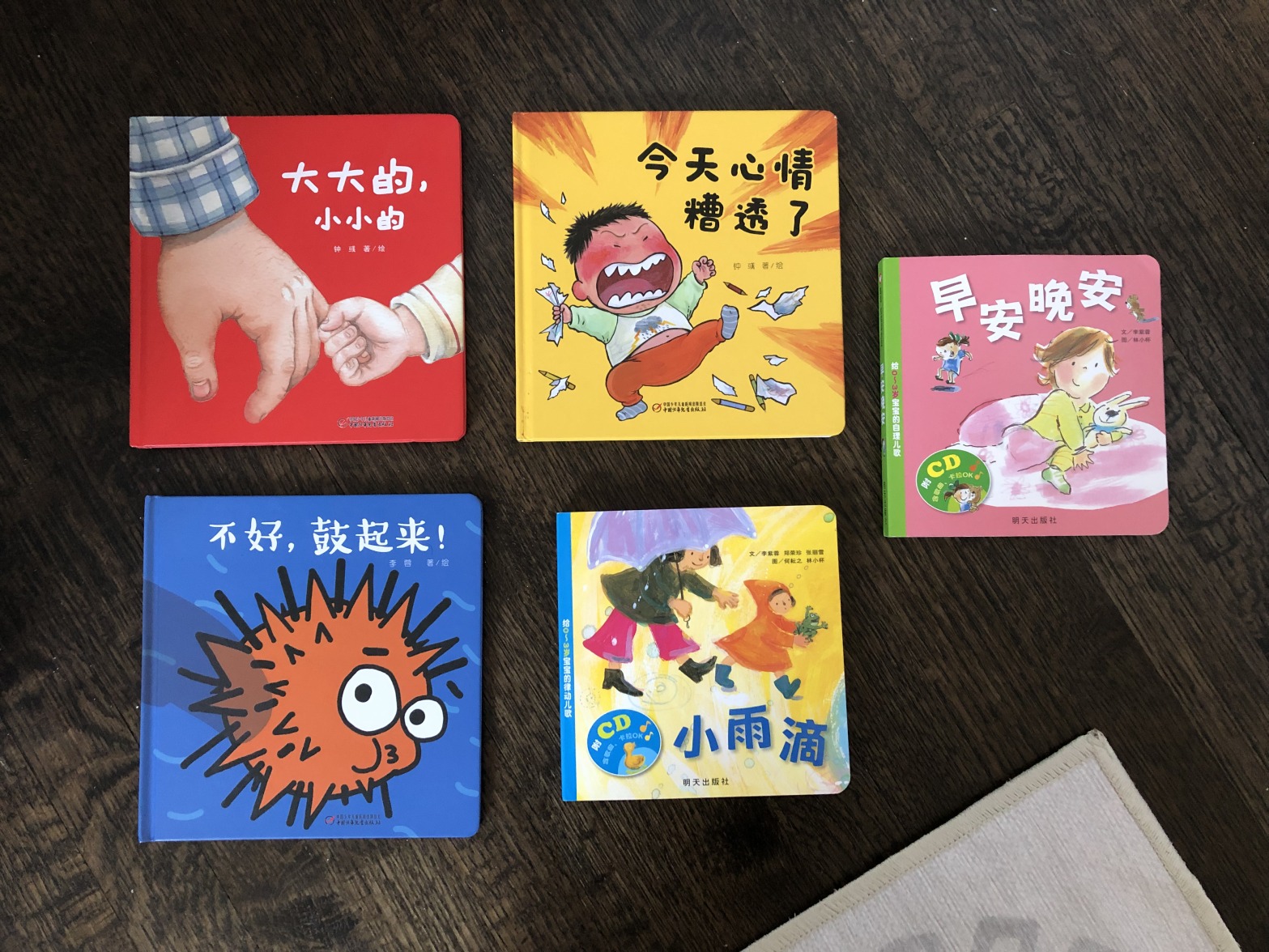Hi everyone, it’s time for our first book review 🙂 These are the books Ro currently loves as an 18-month old bilingual baby. We as parents love these too, but out of all of the many, many books in our house, these are the ones he requests most often.
Chinese books
Sourcing Chinese board books in the US is hard! These are all from jojolearning.com, not sponsored. While they have been expensive, they are high quality and we love them.



早安晚安 [Good Morning, Good Night] and 小雨滴 [Little Raindrop] are books of modern nursery rhymes. Each includes a CD of the songs for car rides and sing-a-longs. 早安晚安 is all about the daily routine, with rhymes about brushing teeth, eating meals, and taking baths. 小雨滴 is full of onomatopoeia and movement, teaching animal sounds, sneezes, and dance moves. A third book in the set, 牛来了 [Here Comes the Cow], has traditional nursery rhymes but is not set to music, and so did not make the cut.
The illustrations are beautiful, the Chinese feels natural, and the topics and vocabulary introduced are super useful in everyday life. Due to a rhyme about brushing teeth in 早安晚安 which says 边刷边唱咿咿咿 [as we brush sing E-E-E], Ro now refers to brushing teeth as “ee-ee”.
Ro loves listening to the CDs on car rides. They are well produced and not annoying for parents.
大大的,小小的 [Big and Small], which Ro refers to as dada, is a story about a Dad and little boy getting ready to go to the park together. Each page follows the pattern 爸爸的杯子大大的,我的杯子小小的 [Dad’s cup is big, my cup is small.]
Again, the watercolor illustrations are gorgeous, and the vocab is super useful. A surprising benefit is that, because the sentences have such repetitive structure, my husband, who can speak and listen but not read well, can read this book.
There is also an adorable meta-story about a dinosaur waiting for his egg to hatch, which Ro absolutely loves.


今天心情糟透了 [Bad Mood Day] is about all of ways a family helps a boy deal with his bad mood. As a parent, the ways that the family helps redirect the boy’s frustration into positive things are very humorous, while Ro loves the sound effects of the boy pounding on the table (dong dong dong!) or stomping on the ground (deng deng deng!)
A potential downside is that the font is sometimes stylized, which may be harder to read for less fluent Chinese readers.
不好,鼓起来![Oh No, Puff Up!] is about a pufferfish who puffs up whenever he is scared, but then realizes that the scary thing is actually Grandpa Turtle or Auntie Shark. The MS Paint-esque illustrations are hilarious for parents, and the repeated 啊!好可怕![Ah! So scary!] are hilarious to Ro.
This book is also great for teaching how to refer to strangers in Chinese – everyone is brother or uncle or grandpa rather than mister and miss.

English Books


Max and Nana Go to the Park [Max 和奶奶去公园] is a story told in photographs of a boy who scrapes his knee at the park. It is told in simple language that is easy to translate, so we often tell this story in Chinese. It also helps that Nana and the Chinese word for Grandma (奶奶) are very similar.
The first time Ro scraped his knee, he was very confused by the blood and, later, the scab. He would point to it days later and I would explain that he fell and scraped his knee and it bled. This book is a great way for him to make sense of a confusing thing that happened to him, and he is very interested in the photos of Max tripping and the scraped knee and band-aid.
Llama Llama Red Pajama [穿红睡衣的拉玛] is a classic about bedtime struggles. Ro cannot say “llama”, so his name for this book is “mama”.
Ro loved this book from a very young age because we would dramatically reenact llama llama’s tantrum. Thankfully, this has so far not led to any bedtime tantrums of our own.
This is also available bilingual!


I Believe in Me [我相信我可以] was an early gift and also an early favorite. As parents, we love watching Ro slowly hit these milestones from “I can stand, clap my hands” to “I can ride down the slide.” We’re still not 100% there – we still haven’t hit “I can jump, tumble bump!” This book has been great for visualizing verbs.
Ro especially loves “I can cry, sniff and sigh,” in which we pretend to cry.
The Very Hungry Caterpillar [好饿的毛毛虫] is another we often read in Chinese (and is available in Chinese). Ro just loves poking all of the holes.
What a Wonderful World is just the lyrics to the song with some beautiful illustrations. We sing rather than read this, and Ro loves it.
Jamberry is a rhyming story about a bear and boy picking berries and is just great fun. Ro loves to point at a drawing of a horse and yell “马!” [horse!]
Mr. Brown can MOO! Can You? often turns into a Chinglish storytelling experience, since onomatopoeia are not usually the same in Chinese and English. (Mr. Brown is smart, as smart as they come! He can do a 河马嚼泡泡糖 [a hippopotamus chewing gum.]) Amazing how the syllables and even the rhyme kind of work out on that one.




That’s all for now! We’ll be back when the favorites change.
